1544 Search Results for link up
December 30, 2015
by Carole Zangari -
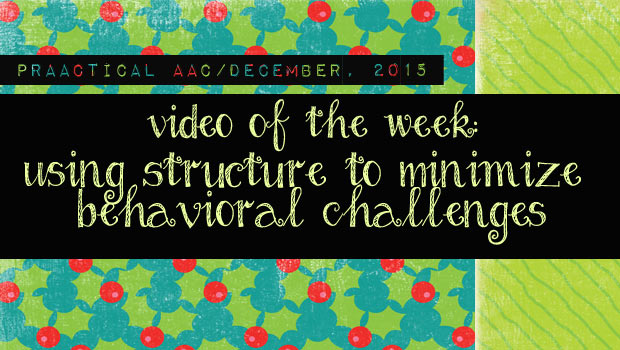
Good AAC therapy is marked by meaningful goals, well-planned instruction, and engaging activities. But for a session to be successful, interventionists also need to be able to manage any problem behaviors that threaten to derail the instruction. Many of the strategies we use to prevent or minimize these behaviors would also be helpful to parents and caregivers. In this week’s featured video, we turn to The Watson Institute in Pittsburgh. This short video is designed to help parents learn about strategies they can use to reduce problem behaviors at home, and can be a great one to share with some of our AAC families. Direct Link to Video: https://www.youtube.com/watch?v=t13ia4_ZImY
December 2, 2015
by Carole Zangari -
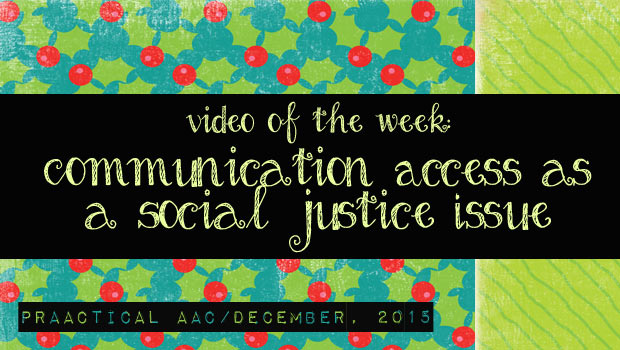
Curb cuts and ramps are standard accommodations in many parts of the world to reduce barriers to mobility. That’s important, of course, but what about the millions of people who are handicapped by barriers to communication? As AAC practitioners, we generally get so wrapped up in addressing the needs of individual clients on our caseloads that we rarely take time to consider the ways in which we can impact systemic barriers to effective communication. We are quite mindful that people with AAC needs struggle to communicate when they leave our therapy sessions and go about their lives and onto the business of learning, playing, and working. We are cognizant of the barriers they face and put on our best problem-solving hats to help them cope. Client by client. Issue by issue. If you’ve lamented “There has to be a better way,” you’re not alone. It seems overwhelming to think about... [Read More...]
October 30, 2015
by Carole Zangari -
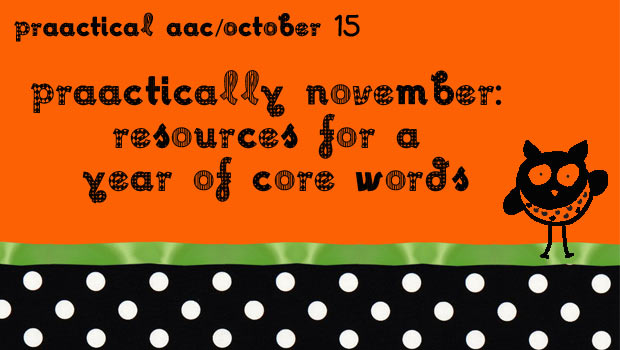
Looking for some ways to help your AAC learners become more competent in using core words? Need to get staff on board with modeling core vocabulary? Trying to get familiar with where core words are stored in a particular SGD or AAC app? Here’s an approach you may want to try: Choose a dozen or so core words to focus on each month. In previous years, we shared lists of some core words to help you do just that. 2013: A Year of Core (12 words/month 2014: A(nother) Year of Core (16 words/month; Note: These are different than the core words covered in 2013) Those posts have links to downloadable grids with the core words for each month that can be used as a focal point for lesson planning. Our words for November are listed below. Set 1 (2013): body, dress, full, guess, hi, live, maybe, one, ride, tired very, walk... [Read More...]
September 16, 2015
by Carole Zangari -
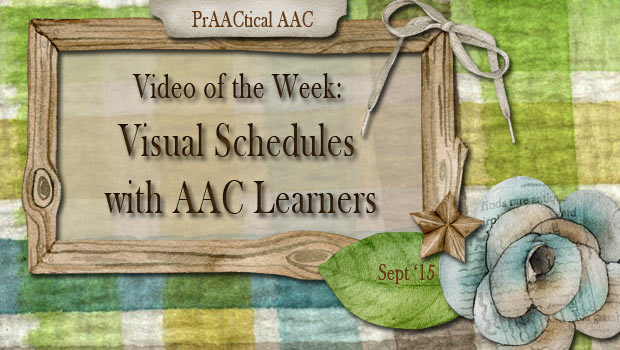
While our therapy sessions are highly individualized to meet the needs of specific individuals, there are a couple of strategies that are effective with almost every learner on our caseloads. Topping that list is the use of visual schedules. Whether it is a written agenda, a picture schedule for the session, a mini schedule for the parts of an activity, or an object schedule for the day’s events, this is one of the few strategies that has something to offer every learner. We’ve written before about this topic. In this post, you can find links to many of the topics we’ve addressed about making and using them. Today, we’ll look at a few videos on the use of this strategy. To get us started, here’s a video of Ann Syrstad sharing information about using this evidence-based intervention for individuals with ASD. Next, we head to Malaysia, where the Early Autism... [Read More...]
September 9, 2015
by Carole Zangari -

There is a short list of presenters that I like go see, no matter what topic they are speaking on. Dr. Caroline Musselwhite has been on that list for a very long time. In this video, she provides an insightful discussion of a pivotal intervention strategy, aided language input. If you appreciate hearing from clinicians who have been doing this work for many years, you will love this engaging and prAACtical presentation. You can get the accompanying handouts here and here. Please note that you will need to register in order to view the presentation. Many thanks to the Angelman Syndrome Foundation for making this available. Direct Link to Video: https://attendee.gotowebinar.com/recording/7139066695959986690
September 2, 2015
by Carole Zangari -
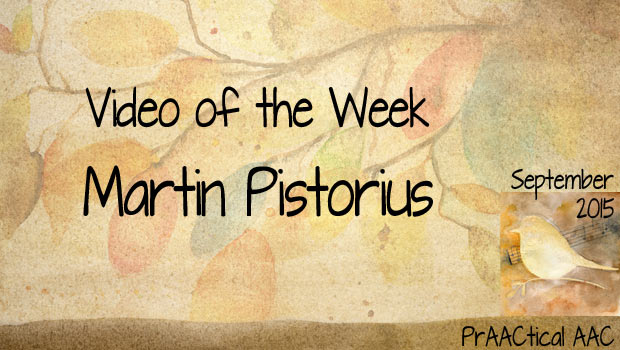
Martin Pistorius, author of The Ghost Boy, was featured speaker at a recent TEDx event. Martin’s presentation was captivating and insightful. The recording covers the entire TEDx KC event, so you will need to skip ahead to find Martin’s talk. (It’s worth the effort.) His segment runs from 44:45-59:00. Enjoy! Direct Link to Video: http://livestream.com/tedx/TEDxKC2015
August 5, 2015
by Carole Zangari -
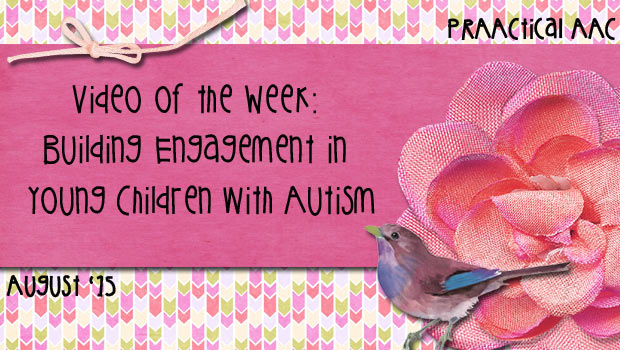
No matter what we are teaching, we won’t get very far unless we can help the learner engage. TASN addresses that very topic in today’s video. You can get the handout for this presentation here. Direct Link to Video: http://connect.enetcolorado.org/p8c8ijffpdl/
July 14, 2015
by Carole Zangari -
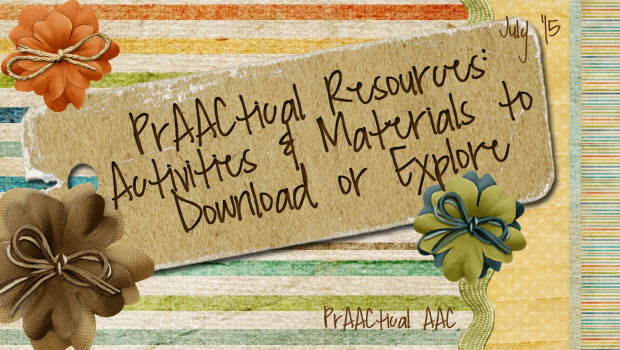
The great thing about getting stuck at an airport these days is that almost all of them have free internet connections. Some people surf the web for celebrity news, fashion tips, or recipes. AAC people, on the other hand, never miss an opportunity to search out interesting tools and resources. Here are a few from my latest airport adventure. Communication Games and Activities from AAC Scotland: Lots of fun and prAACtical ideas, like the Roving Reporter activity. Graphic Organizers with Teaching Notes: Graphic organizers are some of my favorite tools, but it takes time to convert the paper-based ones to interactive PDFs that our AAC learners can use. When I found this site from Holt McDougal (part of Houghton Mifflin), I squealed with joy. It’s a real time-saver! Story Visualizer: This website from the Education Team at Lego is a great way to motivate kids to communicate and build narratives.... [Read More...]
July 13, 2015
by Carole Zangari -
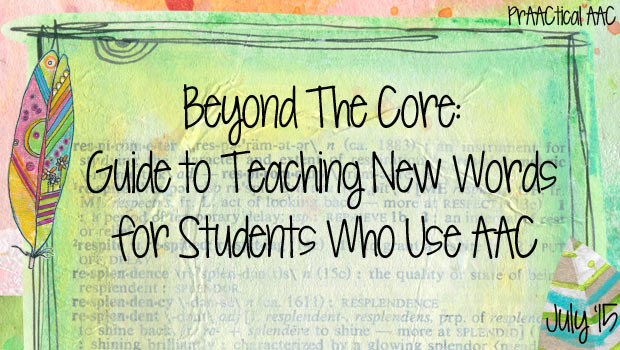
Teaching AAC learners to expand their vocabularies beyond a basic set of core words is an important goal to target in language development, and a topic that we’ve written a lot about in this space. For the student to be successful, SLPs need to think of vocabulary instruction as an ongoing process that has a clear 3-part structure. Introduction: Word is used in context, defined, and produced by the learner. Students assess their own knowledge of the word. Explicit Instruction: Activities are created to help the student really understand what the word means and how to use it. Students begin using it throughout the session. Continued Practice: We continue to use these words and help the student use the target words in the session. Engaging activities, often with technology, are used to help our learners deepen their understanding of the word. This will be accomplished over multiple sessions. In this... [Read More...]
June 29, 2015
by Carole Zangari -
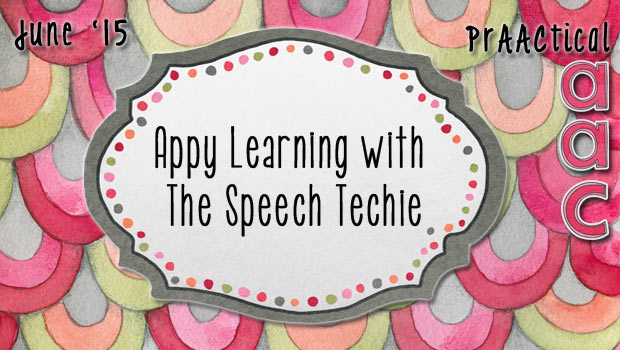
What a wonderful way to start off a summer of learning! Last week, I was fortunate to be able to sit alongside a wonderful group of SLPs, OTs, teachers, and graduate students and participate in two full days of learning from Sean Sweeney, known to many of you as The Speech Techie. Thanks to the generous support of the University of Miami-Nova Southeastern University Centers for Autism and Related Disabilities (UM-NSU CARD) and the Partnership for Effective Programs for Students with Autism (PEPSA), funded by the Florida Department of Education, Bureau of Exceptional Education and Student Services, we were able to offer this workshop for free. The topic, Apps in Context: Aligning Technology with Methodologies and Clinical Objectives for Students with Autism, is one that is near and dear to my heart. Like many on you, I am always looking for new ways to engage AAC learners, and using fun apps is a great... [Read More...]









